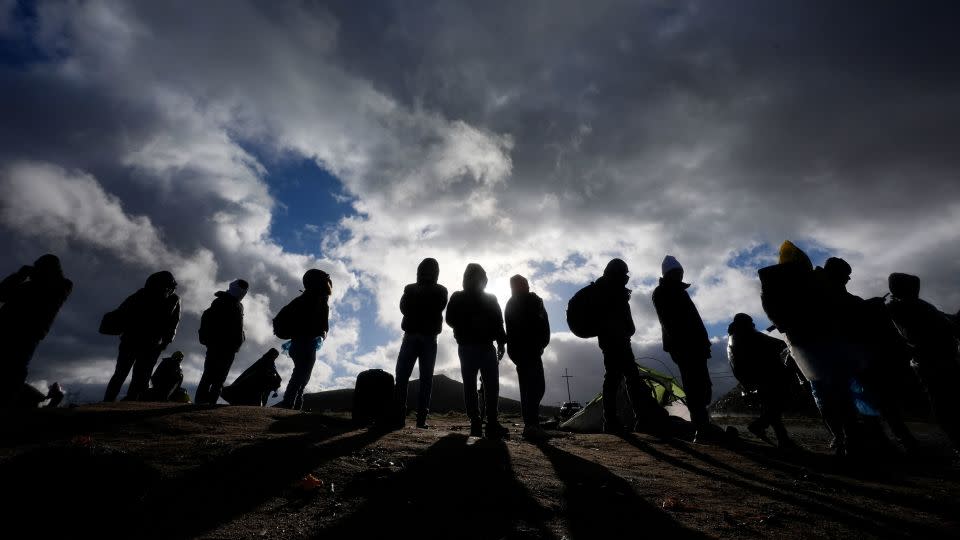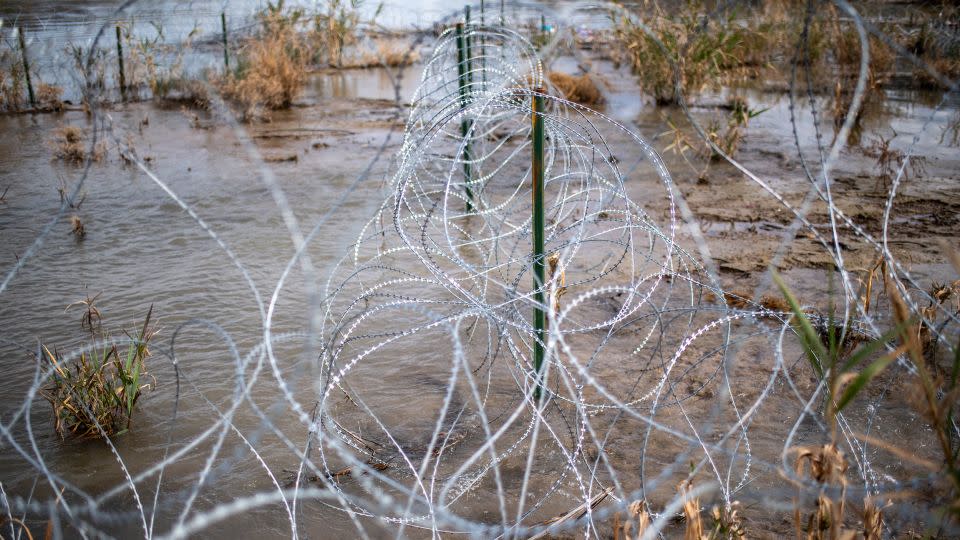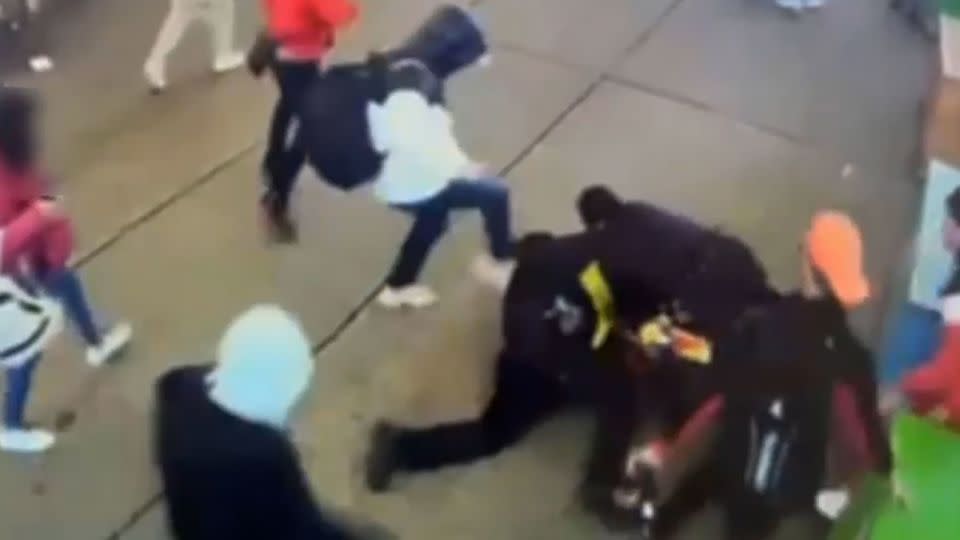I asked criminologists about immigration and crime in the US. Their answers may surprise you
The number caught my attention the moment I saw it.
In a recent Pew Research Center report about the situation at the US-Mexico border, 57% of Americans say the large number of migrants seeking to enter the country leads to more crime.
In other words, most people in the US are now tying crime to recent increases in immigration.
That jumped out at me because it flies in the face of years of studies looking at what actually happened after immigrants came to communities across the US. Many researchers crunching the numbers have found there’s no connection between immigration and crime. Some have even found that immigrants are less likely to commit crimes than people born in the US.
Crime wasn’t the focus of Pew’s recent survey, which found that Americans overwhelmingly fault the government for how it’s handled the situation at the border and gave respondents a chance to weigh in on possible policy solutions.
But when those surveyed were asked specifically about the impact of the migrant influx on crime, there were stark differences across party lines, with 85% of Republicans linking the migrant influx to crime, compared to 31% of Democrats.
The survey also found that 39% of Americans don’t think the migrant influx has much of an impact on crime.
The Pew report is based on a survey of 5,140 adults conducted from January 16-21.
Its release earlier this month came on the heels of several high-profile criminal cases in New York City allegedly involving recent migrants, including an assault of police officers in Times Square and a string of cell phone robberies that prompted the police commissioner to declare in a recent news conference that “a wave of migrant crime” had “ washed over” the city.
And less than two weeks after the Pew report’s publication, another high-profile criminal case drew renewed national attention to the debate around immigration and crime. After an undocumented immigrant was accused of killing nursing student Laken Riley on the campus of the University of Georgia, several national and state political leaders pointed to the case to support their calls for tighter border security.
Georgia Gov. Brian Kemp slammed the Biden administration’s border policies and said in a letter addressed to the president that federal action to secure the border “is the only way to wholistically address this ongoing crisis and ensure that Laken Riley’s horrible fate is not replicated across the country.”
Former President Donald Trump blamed Biden’s immigration policies for contributing to the student’s death and vowed to conduct large-scale deportations of undocumented migrants if he gets elected this fall.
But after the New York assault and robbery cases, Mayor Eric Adams stressed that most of the migrants who recently arrived in New York aren’t committing crimes.
“The overwhelming number of 170-plus thousand migrants and asylum seekers are attempting to continue their next leg of their journey of pursuing the American dream. But those who commit a crime will be treated like any other criminal in this city,” he said.
“These small number of people are breaking the law and having a huge impact on our public safety, and that is why we zeroed in on them.”
All this raises some key questions: Are we seeing an increase in crime tied to immigration? Or is there a gap between public perception and reality? And what can happen when we focus on individual incidents and don’t take stock of the bigger picture?
To get a better sense of what’s going on, I spoke with several criminologists before Pew’s report came out, and checked in with them via email again recently as the Georgia case gained attention. This is what they told me (edited for length and clarity):

These experts have analyzed hundreds of studies about immigration and crime. Here’s what they learned
Charis Kubrin and Graham Ousey literally wrote the book on immigration and crime. They’ve been researching these issues for decades and analyzed numerous studies for their 2023 book, “Immigration and Crime: Taking Stock.” Kubrin is a professor of criminology, law and society at the University of California, Irvine, and Ousey is a professor of sociology and criminology at the College of William and Mary in Virginia.
One reason I reached out to you is there have been some recent high-profile incidents in New York getting some attention.
Kubrin: When I heard about the New York incident, the first thing when I hear about this on the news is like, “Oh, God, here we go.” Because these anecdotal instances — not to minimize the seriousness ever — but the rare occurrences where individuals who are foreign-born, let alone undocumented, are engaging in crime, and it makes the news, I worry about the cascade effect of these incidents overshadowing what we know in the broader context about immigration and crime. Because these are flashpoints. They strike a nerve.
Ousey: Human beings commit crime in pretty much all societies across the globe. But the bottom line is what gets lost in those anecdotal stories — those lead you to a flashpoint of negativity in which you ignore all the potentially good things that immigrants bring to our society. And it’s frustrating to try to bring evidence to the table and try to contextualize things and put it statistically when you’re arguing against this flashpoint that allows people to more or less kind of ignore everything else.
So many people that will respond to those public opinion polls and will recognize that immigrants, you know, have contributed greatly in beneficial ways to society. So it’s like, what are the driving forces that perpetuate, that you know that association (between immigration and crime)? And why does it have so much power? Why does it have so much influence on the way that we think about immigrants more generally or undocumented immigrants specifically? I’m not sure of the answers, but that’s one of the things that kind of really is intriguing me.
What’s the takeaway that you want people to have from your book?
Kubrin: Across a variety of studies that use different years of data that focus on different areas of the United States — with some exceptions, there’s some nuance there. I don’t want to deny the nuance — in general, on average, we do not find a connection between immigration and crime, as is so often claimed. The most common finding across all these different kinds of studies is that immigration to an area is either not associated with crime in that area, or is negatively associated with crime in that area. Meaning more immigration equals less crime. It’s rare to find studies that show crime following increases in immigration or with larger percentage of the population that are immigrants.
Ousey: A lot of people when you say that will then say, “Oh, well, but what about undocumented immigration?” And there’s less research on that topic. But that body of research is growing, and it pretty much reaches the same conclusion.

People are very focused right now on the migrants who’ve recently arrived. Are there studies that look at any of these cities that have seen an influx?
Kubrin: I’m not aware of any (yet).
Based on your expertise from looking at many studies over many years, do you think it’s reasonable to hypothesize or extrapolate that these kinds of longstanding trends would be observed in this group as well in terms of immigration and crime? What would be your theory?
Kubrin: This is where we have to be careful. Because I do think this is a unique population and a unique context. Immigrants are a very diverse group. We talk about immigrants as if they’re one block, right? But they vary on everything, including their motivation for coming to the United States. I do think with some of the recent arrivals we have certain situations where migrants are coming with very little in hand, having escaped extremely traumatic events, coming as refugees in many cases into locations that are not particularly welcoming, and don’t have the resources to help them. Let’s be realistic. Those are not ideal conditions. At the same time, I find it interesting that with all of these thousands of individuals, the headlines so far have been two or three (incidents). The story is not, why are these migrants committing these crimes against police officers? It’s how is it that thousands and thousands and thousands of migrants with these conditions are coming and not engaging in crime? That’s the headline to me.
What are the real-world consequences of these kinds of sweeping statements we hear painting immigrants as criminals?
Kubrin: The consequences of those stereotypes and getting it wrong are that we are pushing and supporting policies on the assumption that immigrants bring crime. And those policies are not only not working, but they’re having collateral consequences that impact not just immigrants themselves, but American society more broadly. … So it’s not just like an academic exercise of public opinion to talk about this. The consequences, the stakes, are pretty darn high.
If we actually want to get rid of crime or lower crime in society, our conclusion is … that restrictive, harsh, exclusionary immigration policy is not going to do it. And there’s a lot of collateral harms, whether we’re talking about the harms to family or children with deportation policies, or the family separation policies, or hate crimes committed as a result of claims about immigrants being criminals.
Is there anything about the Georgia case that changes your assessment of things? Or anything else you would like to point out now that this case is getting national attention?
Kubrin: Nothing on my end, except that I am not seeing calls for radical reforms in response to similar (also very unfortunate) killings of college students by (presumably) native-born individuals, such as what happened at the University of Colorado, Colorado Springs and the University of Idaho recently. In other words, selective outrage.
Ousey: Every murder committed in the United States is tragic, just like this case in Georgia. Violence takes a heavy toll on victims and their families, and on U.S. society, in general. I am saddened by the loss of this young person and truly sorry for the pain her loved ones are enduring.
Seizing on this awful event for political advantage is, unfortunately, the way politics works. Flash point events are used to tap into emotions, and drive specific, and often extreme, policy agendas. It is not a good way to make well-reasoned and effective policy, but it capitalizes on momentum in pursuit of a specific political end game.
What we know from criminological research evidence is that first-generation immigrants are less involved in crime than non-immigrant US citizens. And while fewer studies have focused specifically on unauthorized immigrants, the evidence from those studies reveals a similar pattern: unauthorized immigrants are less involved in crime — including violence — than native-born US citizens.
Given this evidence, it is unlikely that exclusionary immigration policies will produce any ameliorative effect on rates of crime. Unfortunately, in wake of tragedies like the Athens case, many people are simply not interested in evidence-based conclusions.
Is there a ‘wave of migrant crime’ in New York? This expert says it’s too soon to say
Christopher Herrmann is a former crime analysis supervisor for the New York Police Department. Now he’s an assistant professor in the Department of Law & Police Science at CUNY John Jay College of Criminal Justice.
New York Police Commissioner Edward Caban recently described a “wave of migrant crime” in the city as he announced a bust in a ring of cell phone thefts. Is that what’s happening?
There’s an increase in robbery. Is the increase enough to call it a crime wave? No. Are you sure the migrants were responsible for the increase in robbery? No. Do we know if the victims were also migrants? No. … It’s tough to call it a migrant crime wave when we don’t know all these things.

Is there any big-picture data that you would look at to think about what the impact might be of this large number of recent arrivals in the city?
When a New York Daily News reporter asked me about this recently, I gave her what I thought was a good formula: Why don’t you take police precincts that have shelters in them and just look at that sample. Is crime up? Is crime down?
That report in the New York Daily News ended up finding that, in the places they looked at where shelters are located, crime is down this year compared to the same time last year in most categories.
Yeah, most people will tell you that illegal immigrants are better than US citizens when it comes to crime. They’re afraid of getting deported.
Is that a trend you observed when you were at NYPD?
The problem is — and this is definitely like a blue state, red state issue — for a lot of the blue states, we don’t even record immigration status. We don’t really care about that. If you’re committing a crime, we’re going to arrest you. We’re going to put you in jail. If it comes up that you’re not a citizen, and we’re kind of mad at you, then we’re going to maybe turn you over to ICE. But the reality is, a lot of times, we’ll just put you through our system and treat you like every other criminal.
So you wouldn’t really know?
Yeah, there’s no easy way to dig down into this and really figure out, is that an immigrant problem? Is it not an immigrant problem? But I would almost equate it to … like, the New York City subways. Whenever there’s a high-profile incident in the New York City subways, then all these stories come out and everyone is afraid of the subway. And I did the math and it was like eight serious felony violent felonies with like half a million people riding the subway. People like to focus on these high-profile media incidents. I’m not saying that the high-profile incidents didn’t happen. I’m just saying they’re not the norm. They’re the outlier.
Is there anything about the Georgia case that changes your assessment of things? Or anything else you would like to point out now that this case is getting national attention?
Don’t you think we would be hearing many more stories of murder (either offender or victim) if the illegal immigrants significantly impacted the US murder rate?
I think this story will dominate the narrative on the immigration/open-border issues until something else happens. It is not choice/chance that Biden and Trump will both be at the border on Thursday.
This story has been updated with additional analysis from criminologists. CNN’s Elizabeth Wolfe, Raja Razek and Holly Yan contributed to this report.
For more CNN news and newsletters create an account at CNN.com
